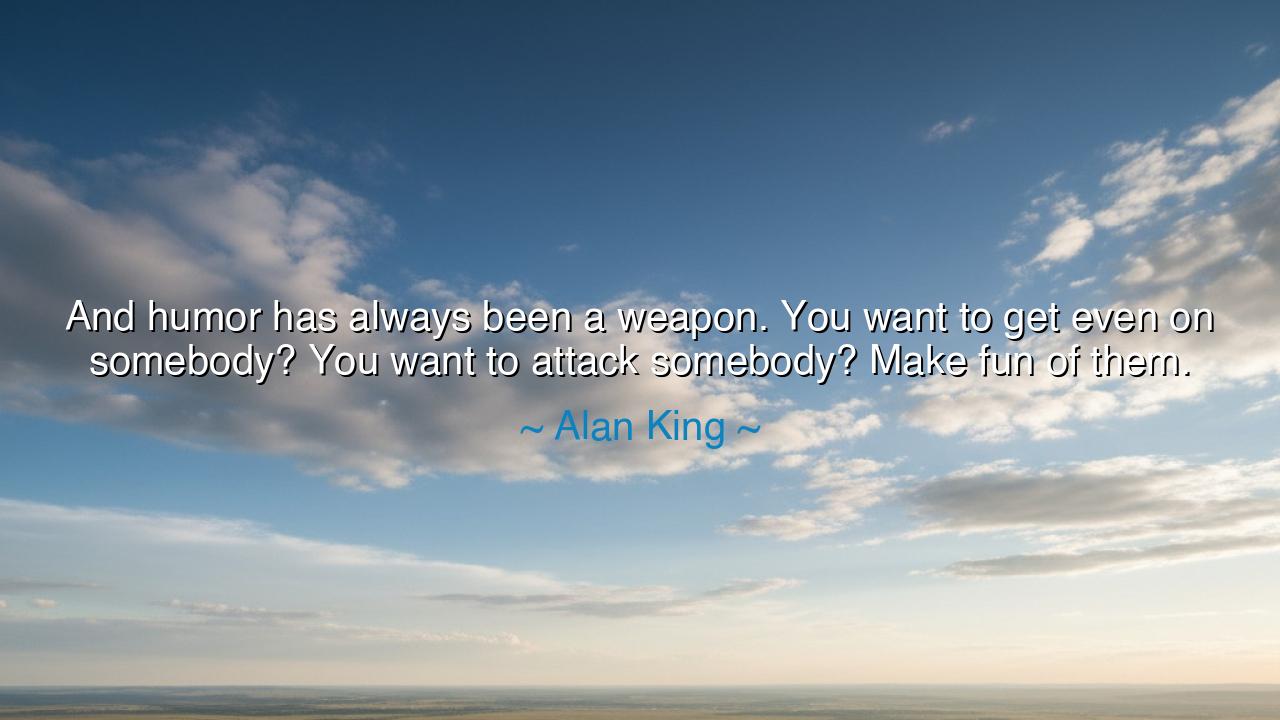
And humor has always been a weapon. You want to get even on
And humor has always been a weapon. You want to get even on somebody? You want to attack somebody? Make fun of them.






Listen, O Children of the Earth, for I bring you the words of Alan King, a master of comedy who understood the deeper power of humor: "And humor has always been a weapon. You want to get even on somebody? You want to attack somebody? Make fun of them." These words, simple yet profound, speak to the potent force that humor wields in the hands of the skilled. For humor is not merely a source of laughter—it is a tool of power, a means by which we can both build and destroy. It can serve as a bridge to connection or a sharp blade to sever bonds. Let us explore the true meaning of these words, and what they teach us about the nature of humor in our world.
What King reveals is that humor, like any tool, can be wielded in many ways. When used for good, it unites and heals, bringing light to the darkest corners of human experience. But when used to attack, it can become a weapon of great destruction. The act of making fun of someone, of using humor to expose their weaknesses or to diminish their worth, is a form of combat—an act of psychological warfare. The jest may not leave visible scars, but it can wound the spirit, striking deeper than any sword or arrow. Through ridicule, one can undermine a person’s confidence, diminish their power, and even turn others against them.
In the ancient world, this truth was well understood. Consider the great Sophists of ancient Greece, whose words were often sharp and clever, their humor a means to manipulate public perception. They wielded their wit as a weapon, shaping political and social discourse through the use of sarcasm and irony. Socrates, though a philosopher of great wisdom, often found himself at odds with the Sophists, and he, too, used humor—in the form of irony and subtle mockery—as a tool to expose the weaknesses in their arguments. The Greeks understood that the power of words—and of humor—could shape the very fabric of society, toppling the mighty or elevating the humble.
Let us look at a more modern example. Winston Churchill, the great British statesman, understood the power of humor in his battle against the forces of tyranny. During the Second World War, Churchill famously used humor to rally the spirits of his people, to uplift their hearts in the face of overwhelming adversity. But he also understood that humor could be used as a weapon against his enemies. Through his biting wit and sarcasm, he reduced the Nazis to the objects of ridicule, weakening their image and bolstering the resolve of his own nation. Humor, in his hands, became a shield and a sword, both defending the values of freedom and attacking the forces of oppression.
And yet, as King so astutely points out, humor’s power is a double-edged sword. When it is used to hurt, to humiliate, or to dehumanize, it does great damage. The mockery of another person is an act of aggression, one that strikes at the core of their dignity. The ancient sages knew that to mock is to seek superiority over another, to make them small so that we might appear larger. This, O Children, is the lesson of humor when it is turned into a weapon: it is a means of control, a way to assert dominance by lowering the worth of another. It is a form of violence without blood, but no less cruel.
Yet, this lesson also teaches us something of profound importance. For the nature of humor reveals a deeper truth: that those who can laugh at themselves, who can withstand the sting of humor, are the strongest. To be the subject of mockery and to endure without losing one’s dignity is the mark of true strength. The ancient warriors of old knew this well. Spartans, renowned for their toughness, would often make light of their own hardships, turning their suffering into a source of courage. They understood that humor, when used with wisdom, could transform the sting of life’s challenges into a weapon of inner strength.
Thus, O Children, let us take this wisdom to heart. Humor is a weapon, but it is one that we must wield with great care and intention. When we laugh at others, let us ensure that our laughter does not come at their expense. Let our humor be a force for connection, for building bonds between hearts, not for tearing them apart. Let us use humor to lift others, to face our own vulnerabilities, and to find joy even in the most difficult of times. Humor, when used with compassion, is a great gift. But when used to harm, it becomes a poison, capable of infecting not just the body, but the soul. Therefore, wield it wisely, O Children, and let it always bring light, never darkness.






AAdministratorAdministrator
Welcome, honored guests. Please leave a comment, we will respond soon